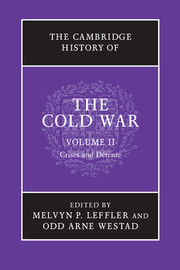Book contents
- Frontmatter
- 1 Grand strategies in the Cold War
- 2 Identity and the Cold War
- 3 Economic aspects of the Cold War, 1962–1975
- 4 The Cuban missile crisis
- 5 Nuclear competition in an era of stalemate, 1963–1975
- 6 US foreign policy from Kennedy to Johnson
- 7 Soviet foreign policy, 1962–1975
- 8 France, “Gaullism,” and the Cold War
- 9 European integration and the Cold War
- 10 Détente in Europe, 1962–1975
- 11 Eastern Europe: Stalinism to Solidarity
- 12 The Cold War and the transformation of the Mediterranean, 1960–1975
- 13 The Cold War in the Third World, 1963–1975
- 14 The Indochina wars and the Cold War, 1945–1975
- 15 The Cold War in the Middle East: Suez crisis to Camp David Accords
- 16 Cuba and the Cold War, 1959–1980
- 17 The Sino-Soviet split
- 18 Détente in the Nixon–Ford years, 1969–1976
- 19 Nuclear proliferation and non-proliferation during the Cold War
- 20 Intelligence in the Cold War
- 21 Reading, viewing, and tuning in to the Cold War
- 22 Counter-cultures: the rebellions against the Cold War order, 1965–1975
- 23 The structure of great power politics, 1963–1975
- 24 The Cold War and the social and economic history of the twentieth century
- Bibliographical essay
- Index
- References
15 - The Cold War in the Middle East: Suez crisis to Camp David Accords
Published online by Cambridge University Press: 28 September 2010
- Frontmatter
- 1 Grand strategies in the Cold War
- 2 Identity and the Cold War
- 3 Economic aspects of the Cold War, 1962–1975
- 4 The Cuban missile crisis
- 5 Nuclear competition in an era of stalemate, 1963–1975
- 6 US foreign policy from Kennedy to Johnson
- 7 Soviet foreign policy, 1962–1975
- 8 France, “Gaullism,” and the Cold War
- 9 European integration and the Cold War
- 10 Détente in Europe, 1962–1975
- 11 Eastern Europe: Stalinism to Solidarity
- 12 The Cold War and the transformation of the Mediterranean, 1960–1975
- 13 The Cold War in the Third World, 1963–1975
- 14 The Indochina wars and the Cold War, 1945–1975
- 15 The Cold War in the Middle East: Suez crisis to Camp David Accords
- 16 Cuba and the Cold War, 1959–1980
- 17 The Sino-Soviet split
- 18 Détente in the Nixon–Ford years, 1969–1976
- 19 Nuclear proliferation and non-proliferation during the Cold War
- 20 Intelligence in the Cold War
- 21 Reading, viewing, and tuning in to the Cold War
- 22 Counter-cultures: the rebellions against the Cold War order, 1965–1975
- 23 The structure of great power politics, 1963–1975
- 24 The Cold War and the social and economic history of the twentieth century
- Bibliographical essay
- Index
- References
Summary
The Cold War saw deepening Soviet–American rivalry in the Middle East from the mid-1950s to the late 1970s on three levels – a geopolitical struggle to recruit allies and secure access to strategic resources (especially oil); diplomatic maneuvers to prevent the Arab–Israeli conflict from escalating into a superpower confrontation; and ideological competition for the future of the Muslim world, where secular nationalists and Islamic radicals shook the foundations of colonial empires and absolute monarchies throughout the region. On three occasions – the 1956 Suez crisis, the 1967 Six Day War, and the October 1973 War – hostilities between Israel and its Arab enemies disrupted world oil supplies, forced Washington and Moscow to contemplate military intervention, and briefly sparked fears of nuclear Armageddon. Once the shooting stopped in late 1973, American policymakers undertook “shuttle diplomacy” between Middle Eastern capitals, prompting the Arab members of the Organization of Petroleum Exporting Countries (OPEC) to lift their oil embargo on the United States, reducing the Kremlin’s influence among Arab nationalists, and inducing Israel to be more flexible on territorial issues, all of which paved the way for the Camp David summit in September 1978. Diplomatic progress on the Arab–Israeli front, however, was undermined by the Islamic upheavals that rocked Iran and its Muslim neighbors during the late 1970s.
- Type
- Chapter
- Information
- The Cambridge History of the Cold War , pp. 305 - 326Publisher: Cambridge University PressPrint publication year: 2010
References
- 4
- Cited by



